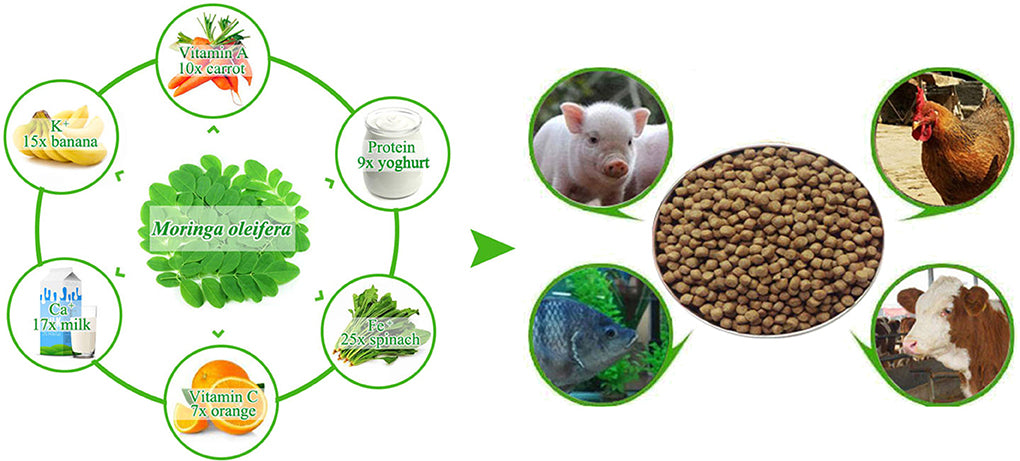In the quest for sustainable and efficient livestock farming, Moringa Oleifera, known as the "Miracle Tree," is emerging as a game-changer in animal nutrition. Rich in vitamins, minerals, and essential amino acids, Moringa not only promises to enhance the health and productivity of livestock but also offers an eco-friendly alternative to conventional feed. This comprehensive article explores the multifaceted benefits of Moringa in livestock nutrition, shedding light on how this nutrient-dense plant is revolutionizing farming practices and setting new benchmarks for animal health and productivity.
Unpacking Moringa's Nutritional Powerhouse
A Rich Source of Essential Nutrients
- Protein-Rich: Moringa leaves and seeds boast high protein content, crucial for the growth, repair, and maintenance of animal tissues.
- Vitamins and Minerals Galore: With an abundance of vitamins A, B, C, and E, and minerals such as calcium, iron, and potassium, Moringa ensures comprehensive nutritional support for livestock.
Antioxidant Properties and Health Benefits
- Boosting Immunity: The antioxidants in Moringa, including beta-carotene and vitamin C, strengthen the immune system of animals, reducing susceptibility to diseases.
- Enhanced Digestive Health: The high fiber content in Moringa aids in digestion and can help prevent digestive disorders, promoting overall gut health.
Moringa in Livestock Diets: Applications and Advantages
Diverse Applications Across Livestock Species
- Poultry: Moringa leaf meal can be incorporated into poultry diets to improve egg production, egg quality, and feather growth.
- Dairy Cattle: Feeding Moringa to dairy cows has been shown to increase milk yield and enhance milk quality by improving its fat content.
- Swine and Goats: Supplementing swine and goat diets with Moringa improves weight gain, meat quality, and overall health.
Sustainable Farming and Cost Reduction
- Eco-Friendly Feed Alternative: Cultivating Moringa for livestock feed reduces reliance on synthetic supplements and promotes sustainable farming practices.
- Cost-Effective Nutrition: Moringa's ease of cultivation and high yield make it a cost-effective solution for farmers seeking to lower feed costs while enhancing nutritional value.
Implementing Moringa in Livestock Nutrition Programs
Best Practices for Moringa Cultivation and Harvesting
- Optimal Growth Conditions: Understanding the agronomic requirements of Moringa ensures healthy plant growth and maximizes nutrient content.
- Harvesting Techniques: Proper harvesting methods preserve the nutritional integrity of Moringa leaves and seeds, ensuring maximum benefits for livestock.
Integration into Existing Feed Regimes
- Formulating Balanced Diets: Incorporating Moringa into livestock diets requires careful formulation to ensure balanced nutrition and avoid nutrient excesses or deficiencies.
- Monitoring and Adjustment: Regular monitoring of animal health and productivity helps in fine-tuning Moringa supplementation for optimal results.
Challenges and Future Directions
Addressing Nutritional Variability
- Standardization of Moringa Feed: Research is needed to standardize Moringa-based feeds to ensure consistent nutritional quality and efficacy.
- Adaptation to Different Livestock Needs: Tailoring Moringa supplementation to the specific nutritional requirements of different livestock species is crucial for maximizing benefits.
Expanding Research and Adoption
- Further Studies on Health Impacts: Ongoing research into the long-term health impacts of Moringa on livestock will bolster its use in animal nutrition.
- Promoting Wider Adoption: Sharing success stories and providing education on Moringa cultivation and use can encourage more farmers to adopt this superfood in their livestock nutrition programs.
Conclusion:
Moringa Oleifera stands at the forefront of innovative solutions in livestock nutrition, offering a sustainable, nutrient-rich alternative to traditional feeds. Its remarkable nutritional profile not only promises to elevate the health and productivity of livestock but also aligns with the principles of sustainable farming. As the agricultural community continues to explore and embrace the benefits of Moringa, its role in transforming livestock nutrition is set to grow, heralding a new era of health, efficiency, and eco-consciousness in animal farming. The journey of integrating Moringa into livestock diets is an exciting venture that holds great promise for the future of farming and animal health.

